|
| 2016 | JAN | FEB | MAR | APR | MAY | JUNE | JULY | AUG | SEP | OCT | NOV | DEC |
| 2017 | JAN | FEB | MAR | APR | MAY | JUNE | JULY | AUG | SEP | OCT | NOV | DEC |
| 2018 | JAN | FEB | MAR | APR | MAY | JUNE | JULY | AUG | SEP | OCT | NOV | DEC |
| 2019 | JAN | FEB | MAR | APR | MAY | JUNE | JULY | AUG | SEP | OCT | NOV | DEC |
| 2020 | JAN | FEB | MAR | APR | MAY | JUNE | JULY | AUG | SEP | OCT | NOV | DEC |
| 2021 | JAN | FEB | MAR | APR | MAY | JUNE | JULY | AUG | SEP | OCT | NOV | DEC |
| 2022 | JAN | FEB | MAR | APR | MAY | JUNE | JULY | AUG | SEP | OCT | NOV | DEC |
| 2023 | JAN | FEB | MAR | APR | MAY | JUNE | JULY | AUG | SEP | OCT | NOV | DEC |
| 2024 | JAN | FEB | MAR | APR | MAY | JUNE | JULY | AUG | SEP | OCT | NOV | DEC |
![]() Read current month's Daily Reflections
Read current month's Daily Reflections
![]() Table of Contents: Daily Reflections
Table of Contents: Daily Reflections
![]() Youtube Channel: Video Listing
Youtube Channel: Video Listing
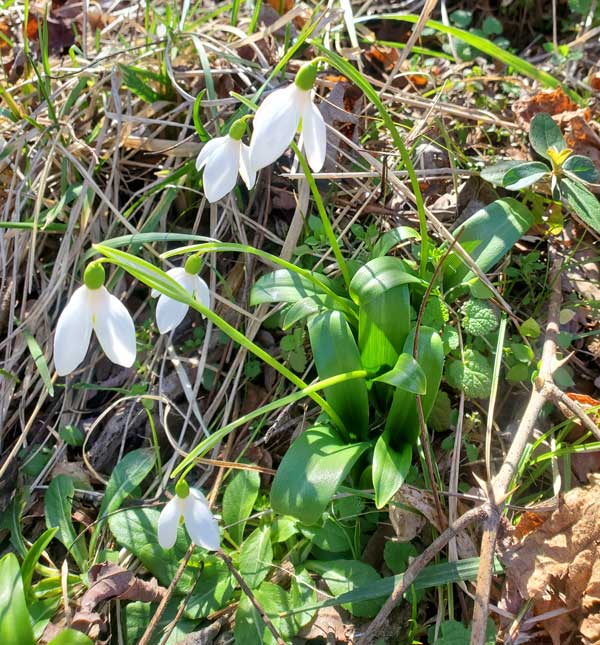
(Photo: Janet Kalisz)
Reflections March 2024
March raises our temperate climate anticipations, for Earth is ready to leap up and bring forth salvation. In Lent we seek to find out more about who Jesus is and focus on the great mystery of the Incarnation; Jesus is teacher, healer, and activist. Winter is finally fading, though it still may have some strong fits and starts. We observe the swelling buds and the semi-hidden shoots. Birds are returning, darting around, and singing with greater gusto. Fresh greens sprinkled with wild garlic give us the taste of the season. We need to make a special effort to smell the forsythia, daffodils, and the dandelions, for their fragrances are faint.
Snowdrops The early arrivals alert us to new life, |
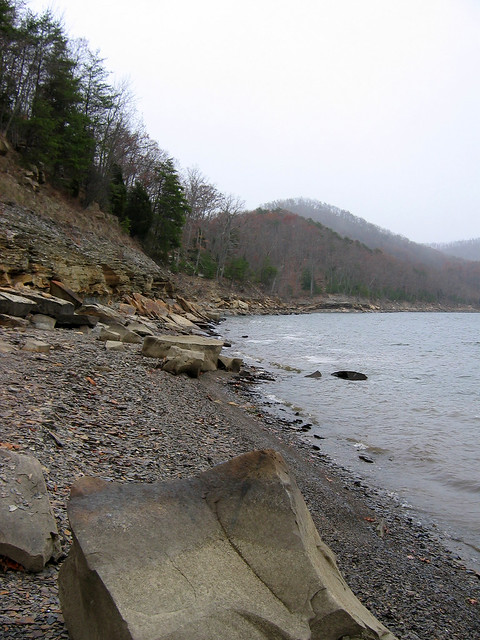
An early March hike in Rowan Co., KY.
(*photo credit)
March 1, 2024 Discovering Our Consolations
This is my son, the beloved. Listen to him. (Mark 9:7)
This unknown soul came up and thanked me for a little something I had said and done, and it came at just the right moment in my life. My work that day was transfigured; it was full of light. Was it a moment of consolation?
We all need the consoling touch of God's hand in our lives. We are not tough guys who can make it through life with nothing but a promise. We need a good word, a pat on the back, a smile -- all these are the seasonings, which make the everyday life flavorful and livable. And we are confident that our merciful God gives these moments of encouragement. We are blessed and if we take a moment, we discover the consoling spirit in the sea of love in which we are immersed as a complex event that is really celebrated twice in the liturgical year: once in the high summer in early August, when the glory of the Lord is shining with full foliage and harvest produce, and once in Lent when Jesus and the disciples need consolation to carry through the upcoming Calvary experience.
Jesus takes three Apostles up the mount carry on his mission. While standing in center stage, Jesus talks with Moses and Elijah; thus he stands out as the greatest of the lawgivers and prophets. Jesus' face is radiant and shines like the sun. Peter's reaction is to say -- "It is good for us to be here;" in our everyday language he could have said -- "Let's take a picture" -- and he offers to erect a stone memorial (incidentally, today on Mount Tabor sits the beautiful church of the Transfiguration). The three tents refer to the giving of the law in the Feast of Tabernacles. God the Father confirms the solemn occasion through sanctioning of what Jesus is doing, all while the disciples freeze in fright.
The Transfiguration is filled with consolation. Jesus needs this for the final mission -- and so do the disciples. After the horrors of Jesus' Passion and Death comes the glory of Resurrection. To be transfigured (transformed so as to be glorified) is to anticipate what is approaching and reach beyond. Transfiguration is the vision of a better world, and occasionally we come to the hilltop, a vista from which we see a horizon. No wonder the Transfiguration occurred on beautiful Mount Tabor overlooking the lake and rolling hills of Galilee. We too need our moments of consolation -- and God provides them. Stop a moment and look at our awakening landscape; God gives us precious moments that are the Gift Giver's consolations to us.

Symmetry of flowers within a friend's bouquet.
(*photo credit)
March 2, 2024 Experiencing Jesus as Perfect Model
How often I longed to gather your children, as a hen gathers her brood under her wings... (Luke 13:34)
Jesus as perfect model comes among us, is the word spoken in our midst; before our eyes he tastes the fullness of human acceptance and rejection, presents an aroma of Divine grace, and touches us in our hearts through love and a more radical compassion. Our beings come to terms with this perfect model of ecological balance. Who is he? That basic question found throughout the Gospels is the question we delve into, but we do so starting simply by experiencing our Earth on which he is born, is obedient, dwells, heals, teaches, and is transfigured. We are truly challenged by Jesus, for he invites us to come to terms with ourselves in coming to know him. An eco-spirituality confronts the difficult assignment of needed action and thoughtful response.
In many ways our present age is devoid of good models for our actions and must piece together the lives of different folks to create a good template. But is this really so? The circumstances are unique and so we strive to hunt for recent lives to imitate. We must see the fullness of the action that is immediate, global, and with major opposition. However, Jesus as redeemer calls out that the time is right, the place of his actions is the entire universe, and he faces the full force of religiosity, in a perverted sense, associated with the most powerful military force in the world at that time. In so many ways we who want to expand our horizon turn to Jesus. He is the perfect ecologist filled with interior balance and exterior care and compassion for others.
God's enormous mercy is always ready to spill forth, for Jesus is mercy personified. This divine mercy is not a mushy sentimentality, a failure to confront the establishment. For Jesus, mercy and righteous anger can coexist comfortably. And ecological balance is exactly that: a balance and harmony. Jesus is our model for compassion and his compassion is infinite compassion, whereas ours is so utterly limited.
During the course of this month we will touch on Jesus as model activist, healer, teacher, and savior of all. These include many elements written in our book Jesus Christ Activist, available asa Kindle book on Amazon. As we plunge into troubled times, we need this eco-balance that only Jesus gives to us to imitate in our actions. We, in turn, become more balanced by learning through the reflected Word, attempting to heal ourselves for the task before us, and preparing ourselves for the difficult task of saving our troubled Earth. Helping us do these things, we consider for the next few days certain experiences with nature through all our senses and how we are tuned in to the spirit in all of us.
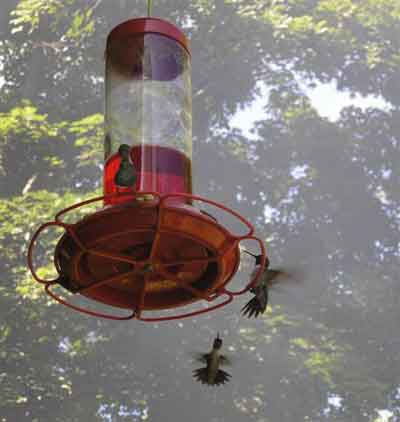
Grace of the hummingbird's wings.
(*Photo by Marge Para)
March 3, 2024 Observing the Flying Birds
Look at the birds of the sky. They do not sow or reap or gather into barns;
yet your heavenly Father feeds them. (Matthew 6:26-27a)
It was nice going to the field after school at this time of year, and following my dad as he plowed (ground-breaking as opposed to tilling or cultivating) with the team of horses. It was for him the hardest work of the year, holding the heavy plow steady and still directing the three-horse team properly. He was always accompanied by a massive number of opportunistic birds of various species (cow birds, swallows, red-winged blackbirds, etc.), which allowed him to deliver their grub and worm-filled lunches and suppers. It took human effort and yet these chirping gatherers seemed so happy -- and they were. I have often thought that Christ came into our care-free world and delivered himself for us through great effort like that of a plowman. And he did so freely.
Care-free birds. They have not yet secured tonight's meal, and still they sing, swoop about, preen, and carry on as though they are millionaires without a care in the world. If we didn't have tonight's meal bought, paid for, stored, and prepared in some fashion, we would be quite upset. However, even long distance flying birds sing cheerfully, and then rest a little to gain the energy to move on. They do not show concern about the next meal and yet they will need it for continued nourishment. In some ways the primitive hunter/gatherers had the same practices, but in late winter they were more concerned than perhaps the birds as stored edibles began to diminish. They may have pondered: what a life to be as carefree as a bird!
Freedom from worry. From the seemingly carefree birds respecting no boundaries and operating on instincts, we can learn valuable lessons as Jesus indicates to us. We, who pride ourselves on being Appalachians and always "free," are all too often susceptible to concerns and cares that truly restrict that God‑given freedom. We dig grooves in which we place ourselves, struggling to move along self-made rutted tracks. We fetter ourselves in worry, and wonder about what tomorrow will bring.
Spiritual flight. Individually, we cannot physically fly in the air like a bird; we can hardly get out of the land‑based confines that we have made for ourselves. But our trust in God gives us certain wings associated with true hopes and desires, which liberate us from self‑centered activities. We are tempted to be influenced by peer expectations and remain in grooves made by habit and routine. Let's learn from the birds; they tell us something about how we are to handle life's persistent problems. And with power rendered in the presence of the Lord we can also turn March into a quest for spiritual freedom.
Yearning for the Divine
By Fr. Al Fritsch, SJ
As the deer longs for streams of water, so my soul longs for you, O God. Psalm 42 expresses powerful longing, like that of thirsty animals striving to get enough to drink. Most of us can relate to the experience of being thirsty and the satisfaction when that thirst is finally quenched. When we say that we all yearn in this fashion, it might be true in the physical sense, but there are some who do not long for the Lord, who are stuck in the status quo, unwilling or unable to move, and satisfied with the way things are.
Some are simply taken up with their own longings and yearnings which are material in nature and therefore they do not enter into this picture at all. Yearning for the Divine involves your heart, and high-sounding intellectual discussions or merely reading the scriptures will not get us there. When the heart pines continuously there arises a possibility of the divine experience. We desperately want to move beyond the petty wants of the ego and break out of the self-constructed prisons that confine us.
We may be too cynical or pessimistic to believe that any life other than the one we are used to is possible, and we may stifle our yearning out of fear or a need for stability. But the world is full of events that we cannot predict and don’t expect, and we have to take what occurs and somehow work with it. For example, as we age we may have health problems to deal with and yearn to be healthy, yearn to overcome things that are getting in our way. We can ask God to help us but we must be participants in this journey, and if we look only for ourselves, not thinking of others, we have forgotten the commandment to love our neighbor as ourselves and God with all our heart.
This world, the field for building God’s Kingdom, reminds us of words from the Our Father prayer, Give us this day our daily bread. We’ve said in the past that this is not given miraculously by God to people who sit with their arms crossed and hands outstretched. It is us giving bread to one another, and therefore what we must ask of God is a grace that we can give more properly and be of greater service to those in need today. Giving us our daily bread involves receiving and giving bread as well.
Saint Augustine states “...our heart is restless until it rests in you.” Yearning is the force field of desire that draws us to God. It grows out of our sense of incompleteness and our deep need for something more which we know can only be met by God. It is characterized by a restlessness in our souls. One may ask, “Aren’t we supposed to attain peace of soul and tranquility?” And of course we say yes we are to be peaceful, but our peace comes from feeling that we’re on the right track, moving towards where the Lord wants us to be. We participate and move with hope for a new heaven and a new earth.
Peace of soul means that we are working with the Lord with a full and yearning heart, with restlessness and tranquility existing there simultaneously. Ponder the importance of yearning properly and ask for an authentic and perfect understanding. We challenge all to enter into this prayerful life and find your place in it. Allow yourself to reach for fulfillment.
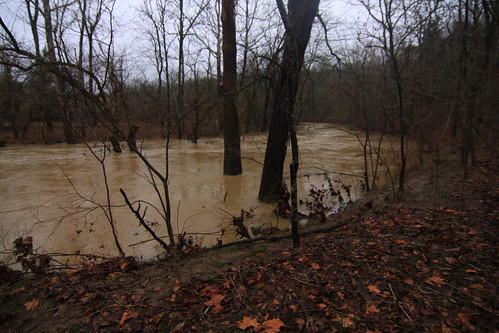
March floodwaters in Kentucky creek.
(*photo credit)
March 4, 2024 Listening to the Raging Floods
YHWH, the rivers raise,
the rivers raise their voices,
the rivers raise their thunders;
greater than the voice of the ocean,
transcending the waves of the sea,
YHWH reigns transcendent in the heights.
(Psalm 93: 3-4) also (Habakkuk 3:10)
I never felt more helpless than when the flood waters reached the highway (KY 1329) and raced down it, showing the speed of the rising waters. I stood momentarily motionless and listened to the roar of the tide as it came through the narrow constricted Rockcastle River Valley from a relatively large upstream watershed. The runoff comes so unexpectedly, so quickly, so forcefully. High water bears the threat of disasters, which have occurred many times in Appalachia. The sounds of the flooding rivers and creeks can be terrifying to those who live in these parts. The experience is most often quite personal and familial, for flood plains are the only affordable home sites for many poorer folks.
We love our rivers and creeks, but we learn to respect them as unmanageable creatures at certain times. Waterways have their quiet moments for wading, fishing or swimming. But then comes the muddy swirling tide, and all humans and wildlife scramble to stay clear of the raging waters. "We'll be there Lord willing and the creeks don't rise" is an Appalachian expression, referring to unexpected floods -- and they are more frequent in March.
Listening acutely we hear "floods" of verbiage and allurements from many sources. Some can bombard us with advertisements that are so enticing to many folks. The advertisements are meant to attract and captivate us and bring us to buy a particular product -- and that starts with ads to little children watching TV and then continues unrelenting throughout life to old age. They do not scare us like the gushing water but so often we are just as helpless before their on-rush. The wash of propaganda in the form of fossil fuel "necessities" are meant to make us hesitate in coming to a renewable energy economy -- and yet this is a flood in its own right. The manner of resisting these materialistic floods ought to be patterned after how we avoid excessive water damage.
Nature teaches us to use our streams well but to keep our distance, especially when the otherwise slow‑moving stream becomes a rampage. Yes, nature has a way of teaching us respect. Its voice is its roar, and we both hear and heed its advice. Obey the warnings and get to high ground. What we need to hear more clearly is the inner voice calling for careful listening, a lesson taught through our Lenten observances. Respect what you must and avoid super-human heroic feats. Live simply in obedience to God's will and beware of the hidden floods of life.
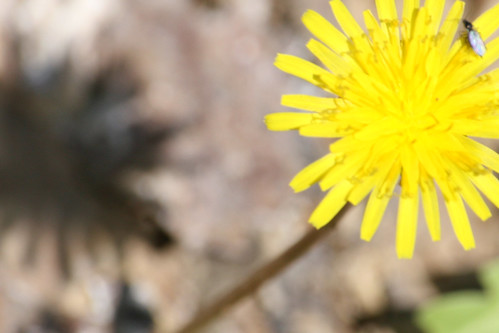
Dandelion, Taraxacum officinale, with shadow.
(*photo credit)
March 5, 2024 Smelling and Tasting Dandelions
How fragrant your perfumes, more fragrant than all other spices! (The Song of Songs 4:10b)
Nothing tastes better after a long winter than a mess of spring dandelion greens prepared in a mouth‑watering manner. Mama always prepared dandelions by dicing in onions, boiled eggs, and potatoes and covering them over with vinegar and bacon grease and a dash of salt, pepper, and sugar. That dish became the special delight of a late winter or early spring supper.
My favorite flowers include ornamentals and "pests." None is nobler than the dandelion, which can actually be spotted blooming in our region in every month of the year -- at least in a rather subdued manner in winter months at certain sunny places with heavy leaf cover. The dandelion, like Appalachian people, can thrive amid great adversity. The roots of the dandelion (lion's teeth) are deep and strong and can be dried to make a nutritious coffee-like beverage, which many find pleasing. The humble dandelion flower is the source of a yellow wine, which has its unique aroma and taste.
Dandelions are some of the year's earliest flowery fragrances. Later flowers will offer us a more pungent scent, but the dandelion with its faint floral odor holds preeminence by early arrival and satisfies our quest for natural aromas. Those who regard dandelions as pests should try harvesting these hearty plants for all their good parts -- nutritious leaf, rich flower, and hearty root. Besides, dandelions prove far less labor intensive than the cultivated greens that come later and are often at the mercy of harsh weather. Yes, dandelions are friendly companions, if we but see, taste, and smell the often overlooked benefits of nature.
Simplicity comes with the dandelion, for plants, like many simple things in life, are overlooked and under appreciated. Thus in the first spark of spring renewal we should reflect on the hidden secrets of late winter that we often regard as nuisances. Why should we make these hearty plants targets of herbicides and other weapons of human destruction to replace them with monocultural grasses? Dandelions thrive on their own. I will never forget the lush dandelion covered fields of central Wisconsin and wondered if any residents saw these as a glorified field of immense nutrition.
Fr. Albert Joseph Fritsch, S.J. Obituary
Let us pray in thanksgiving for the life of our brother, Fr. Albert J. Fritsch, S.J., who died on March 5, 2024 at Colombiere Center in Clarkston, Michigan. He was 90 years old. May he rest in peace.
Al is survived by his siblings: Charles Fritsch, Edward Fritsch, Frank Fritsch, and Mary Patricia Hoover. He is preceded in death by his sister, Dorothy Harmeyer.
Al was born on September 30, 1933 in Washington, Kentucky. Before entering the Society, he earned a Bachelor's Degree (1955) and a Master's Degree (1956) in Chemistry from Xavier University in Cincinnati, Ohio. He entered the Chicago Province of the Society of Jesus on September 1, 1956 at the Jesuit novitiate in Milford, Ohio. He was ordained a priest on June 8, 1967 at Bellarmine School of Theology in North Aurora, Illinois, and pronounced final vows on August 15, 1973 at Xavier University.
While in the Society, Al earned a Doctorate in Organic Chemistry from Fordham University in Bronx, New York (1964). In 1968 he earned a Licentiate Degree in Sacred Theology (1968) from Bellarmine School of Theology in North Aurora, Illinois.
During the years that his Jesuit cohorts were missioned to Regency, Al was in doctoral studies at Fordham University. After Theology Studies and ordination, Al was a research associate at the University of Texas in Austin, Texas (1969-1970) before being missioned to Washington, D.C., where he worked with Ralph Nader as a chemistry consultant at the Center for the Study of Responsive Law (1970-1971). Al then became the co-founder and co-director of the Center for Science in the Public Interest (1971-1977).
In 1977, Al was missioned to Kentucky where he took his knowledge and understanding from working with the Center for Science in the Public Interest and founded Appalachia Science in the Public Interest, a non-profit resource center advocating for sustainable development, responsible resource management, and informed personal choices. Al was the executive director of Appalachia Science in the Public Interest for twenty-five years (1977-2002). In 2002, Al was missioned to sacramental and pastoral ministry in Kentucky at: Good Shepherd Parish in Frankfort (2003-2004), Our Lady of the Mountains Parish in Stanton (2004-2008), and St. Elizabeth of Hungary Parish in Ravenna where he was pastor (2008-2023). While doing pastoral ministry, Al continued researching and writing about environmental issues and sustainability. He began the website EarthHealing.info in 2004 and posted [often] daily reflections and videos about living sustainable lives and caring for the Earth. Al was missioned to Colombiere Center in 2023 to care for his health and to pray for the Church and the Society.
Al was a devoted priest, a conscientious scientist, and a prolific writer. Al's love and care for the Earth and environmental advocacy started early in his life — and long before Universal Apostolic Preference #4 existed — as can be seen in the title of his first book (which was published in 1972): A Theology of the Earth - The Contrasumers: A Citizens Guide to Resource Conservation. His integration of science, research, scholarship, writing, and serving as a voice for those without such a voice was incredibly well-integrated. His passionate search for justice on behalf of those who were marginalized or ignored by corporations who demonstrated little or no concern for people impacted by their negligence was fearless, remarkable, and grounded in the Catholic social ethics of the Roman Catholic Church.
In addition to his care for the Earth, Al was a real man of prayer, had a devotion to the sainthood cause of Père Jacques Marquette, and served his parishioners with deep devotion. [In spite of living alone for a good portion of his life,] Al was a fine community man who delighted in sharing sacraments, meals, and conversations with his brother Jesuits. He also was never afraid to stir the pot if he felt such was necessary to speak the truth - but always done respectfully.
He was a true son of the Commonwealth of Kentucky and was grounded in and relied on the simple but profoundly deep faith of his parents and siblings. His writings, poetry, podcasts, and everyday conversations were a rich source of intellectual and pastoral engagement for parts of the Church that were often considered on the periphery.
Parishioners remember how "Fr. Al" fostered a welcoming and accepting parish community. They fondly remember helping him to plant fruit trees and install solar panels on the parish property. He was always available to those in need and was instrumental in strengthening the faith — and environmental consciousness — of the parish community. Finally, Fr. Al's entire life was about service to others and making the world a better place, whether it was through his sermons, his publications, his environmental work, his website, and his Facebook page.
When asked in a 2020 interview about his time in Washington, Al stated:
At that time, we thought the environmental problems would be solved quickly. The first issues we worked on — lead in gasoline, tobacco, asbestos — actually were addressed pretty quickly. There was ample bipartisan interest in doing something, and several issues were cleared up with some government regulation. I actually thought I’d be moving on to something else. As we progressed, however, we recognized bigger underlying issues. We came to the conclusion that consumer addiction was a problem that was not going to be solved quickly. We couldn’t even contemplate the future ravages of climate change at that time!
Fr. Walter Bado has these thoughts about Al:
Al deserves a choir of angels singing St. Francis' Canticle of the sun for all he did to cherish and nourish Mother Earth and her divine milieu. In addition to to his researching, writing, and podcasting in connection with "Appalachia: Science in the Public Interest", Al served as pastor in the newly created missionary diocese of Lexington, Kentucky. First, at Good Shepherd parish in Frankfort — with the condition (agreed to by the then head of the diocese, Bishop Ronald Gainer) that he wouldn't have to attend all the parish meetings! Al then served for almost two decades as pastor of St. Elizabeth of Hungary, an outlying parish in the Bluegrass boonies. There he continued to maintain his simple life style, living off the produce of his model fruit-and-vegetable garden adjoining the parish rectory. But in his homilies he continued to give God's people the message of just stewardship of God's bounty. May Al rejoice in the heavenly singing.
Suffrages: As we remember with gratitude all that God has done through his life of service to God and God's people, we are reminded of our privilege and obligation to offer Masses and prayers for his eternal repose. All members of the USA Midwest Province and those applied are to offer one Mass intention. Members of the St. Camillus Jesuit Community will offer one additional Mass intention. All will wish to remember Al in their prayers and Masses.
Visitation:
Sunday, March 10, 2024
4:00 - 7:00 p.m.
Service 7:00 p.m.
Colombiere Center
9075 Big Lake Road
Clarkston, MI 48346-1015
Mass of Christian Burial:
Monday, March 11, 2024
10:30 a.m.
Colombiere Center
The Service and the Mass will be LiveStreamed at:
https://www.youtube.com/channel/UC9TJEVaNcLIQmq5H37lepXQ
Fr. Al will be buried in St. Patrick's Cemetery in Maysville, Kentucky.
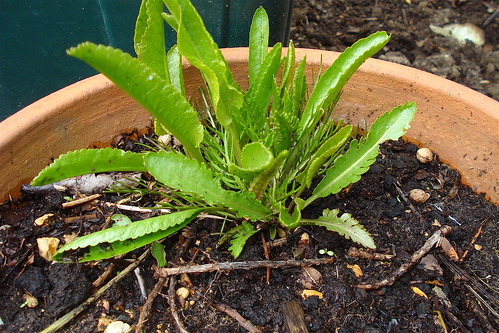
Homegrown horseradish.
(*Photo by Christian Guthier, Creative Commons)
March 6, 2024 Whoa! Whiffing Fresh Horseradish
That night, the flesh is to be eaten, roasted over a fire; it must be
eaten with unleavened bread and bitter herbs. (Exodus 12:8)
Each region has its own foods, and so it is in Appalachia. Our people do not like some of the spicier foods of more tropical regions, but we do like horseradish, a rather strong and pungent herb. In late winter, our horseradish reaches its maximum strength, and after digging the root, the fun begins. As long as the horseradish root is kept below the surface of water there is no problem. But when horseradish is ground, our eyes water profusely, for the juices and mist arising by root grinding make us awake. It's time to have a good cry about a pertinent issue.
This herb, horseradish, reminds us of the Chosen People's Passover menu ingredient of bitter herbs, the taste of endured oppression. We know the Israelites use roasted lamb and unleavened bread and bitter herbs ‑‑ a symbol of the torture and pain endured in captivity. For many of us eating horseradish is a solemn reminder of forbearers who cleared the land, homesteaded, and worked the forest and mines. These were people who liked tasty regional foods and acquired the strength and courage to carry on.
We like our sandwiches spicy and meats dabbled with the cream- colored hot stuff, for these make the bland into tasty meals. We need various tastes as much as a profusion of colors and a symphony of sounds. Let's recall the pioneers who went before us to make us who we are -- and enjoyed the right spices of life. And let's continue to use this symbolic condiment on our ham, baked beans, grits, gravy, and a hundred other ordinary and occasionally indulged foods. Try spreading it on a peanut butter sandwich or take a pinch to help stay awake when driving. It always works wonders, for tastes have their place in ordinary daily practices.
Endurance comes with horseradish and ought to be on the label; it is also a quality of Christian experience. To become like the perfect model, Jesus, takes a high quantity of strength and perseverance. It takes both prayer and a certain patience that overcomes the hesitancy holding us back from true discipleship. Horseradish is like a blinking light, giving us warning that we need to celebrate simple tastes and experiences as part of daily life. We endure burdens in many moments of ordinary living and need to be alert to what lies ahead. Horseradish reminds us of that condition that must be overcome so that liberation occurs. Its crushed root prepares us for the process to greater freedom that is what lies in store for us.
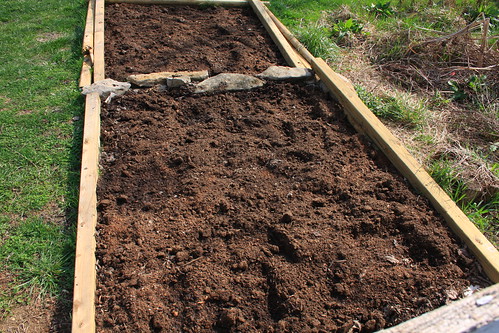
Freshly-prepared garden plots.
(*photo credit)
March 7, 2024 Touching Newly-Turned Soil
For as the earth makes fresh things grow,
as a garden makes seeds spring up,
so will the Lord YHWH make both integrity and praise
spring up in the sight of the nations. (Isaiah 61:11)
It is utter joy to have that first day of serious gardening in March. Now once again we are in touch with living Earth and all its multitude of organisms. Upturned soil gives a sense of utter freshness and renewal; organic matter becomes the humus of plant life and brings us closer to our life source. We let the fine texture of moist earth filter between our fingers. Spring is coming and so is new life. Getting garden dirt under my fingernails doesn't seem to be such a burden after all. Dirt is soon washed away, but it hardens the working hands that are the badges of labor well done so that we might stay properly oriented and hope-filled.
We balance our heavenly call beyond the horizons with the immediate earthly voice to look down at this moment. To be in touch with both tendencies is to allow our eco-balance to be deeply rooted and to grow as a witness to good gardening, even under harsh conditions. Yes, we are dust and have an affinity to it; we may be humble but we are both dust and bound for eternal glory; thus we shine through and endure the dust storms of everyday life.
To touch soil is a sacramental sign of our redemption. We need to reach down and do so with reverence and respect. When the snow melts and the land starts to warm up, our minds turn to gardening and we go outdoors at the first chance. It is great to touch that life-giving substance and get it in our fingers, on the palms of our hands, and right up to our elbows. Rich earthworm‑ filled dirt, granular humus gives us delight. We have glory right below our feet. We are connected to Earth, we feel an electric current coursing through our bodies, and a surging of life.
Rootedness is a quality worth pondering. From dust and into dust we hear on Ash Wednesday, and remember these words through the time of Lenten austerity. The soil becomes our source of humility, of simple living, of knowing who we are, where we come from, how we are rooted, and where we will eternally rest. To know our Earth is to know ourselves, for we are strangely attached to and defined by this planet's organic matter. Even more ironic, rootedness is mixed with our wanderlust, for all is change and we have no lasting city. We need to reconcile these seemingly contradictory movements within ourselves. Now is the time to come to grips with who we are and what is our destiny. We look to that perfect model Jesus, find out who he is, and see how he handles those moments of being both mobile and still deeply connected to his roots.
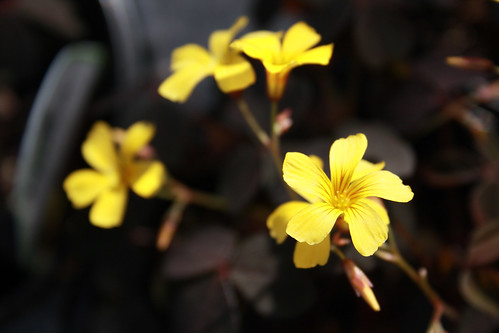
Sorrel, grown in small Kentucky greenhouse.
(*photo credit)
March 8, 2024 Money-changing in the Temple
My house will be a house of prayer... (Luke 19, 45-46), for all the peoples. (Isaiah 56:7), (Mark 11:15-18)
Today's Gospel (John 2:13-25) is one of my favorite passages of Scripture. However, a commentary I have read says, "Precisely why the business of the temple offended Jesus is not clear" -- truly a puzzlement for the non-activist, at least through the eyes of us activists. The commentator proposes that Jesus opposes the carnival-like atmosphere, cheating against the poor, and commercial activity in a sacred place. Furthermore, this issue had a long history both scripturally and beyond. Isn't it much more?
Money-changing was important for practicing Jews of that period to rid themselves of coins with Caesar's image (rendering to Caesar and God). But why did Jesus drive out the animals used for sacrifice? Zeal for the Father's house moves him -- for Jesus is an activist. All four gospels tell of this episode: John 2: 13-22 adds Zeal for your house will devour me from Psalm 69:9. Jesus quotes Scripture in saying it is to be a house of prayer and yet this sacred "commons" and house of prayer has been turned into a marketplace. Mark adds that Jesus says "but you have turned it into a robbers' den"-- a phrase taken from Jeremiah 7:11 (also found in Matthew 21: 12-13). The episode occurs in all three synoptic gospels in the time immediately before the passion and death of Jesus, and is followed by the plot to kill him by his enemies. In John's Gospel, the episode comes very early, but his entire Gospel shows the struggle of light and darkness.
Recall that the episode in all four gospels is quite pivotal, even though many Christians find it embarrassing. Driving out the moneychangers is Jesus' supreme career test -- and his enemies plot to put him away from that time on. Jesus acts alone (without disciples); he is driven by the Spirit in the prophetic tradition; he acts with authority; he makes a public manifestation on the side of and in favor of the poor and little people; and he risks his own career of service.
Spirituality is not suppressing anger, but directing a righteous variety properly. Our goal is justice for all, especially our neighbors. Being silent condemns us through the sin of omission. We are led by the Spirit to speak out boldly at whatever the cost, much like Stephen, the first martyr, when he was stoned. It is bad to allow anger to fester within us, for it can turn us into hate-filled people and burn us up inside. The challenge is to imitate Christ and control our anger -- all the while loving others through mercy. Jesus exercises perfect balance and is the perfect ecologist. He announced the year of favor of the Lord, a liberation, and then he proceeds to act. Part of our liberation is to be free from panic through God's grace and to work resolutely to address the challenge of climate change.
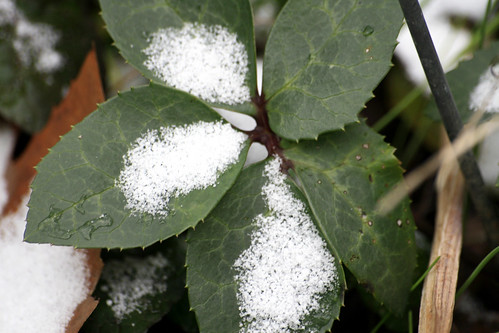
March snow on leaves of Lenten Rose.
(*photo credit)
March 9, 2024 Knowing Jesus as Activist
Driving out the moneychangers involves several activist tendencies worth mentioning:
* Jesus is a free spirit. He knows what must be done and he does not hesitate to do this even with the heavy risk of being stopped by the powers that be. Jesus is prophetic enough to know what is coming if practices do not change.
* Jesus acts alone -- He is without the immediate support of his disciples. This public action must be undertaken and so he acts in a traditional activistic manner -- but it is before the Spirit has come to the disciples and they are somewhat paralyzed.
* Jesus is driven by the Spirit -- He is led by the spirit in all that he does whether it be to the desert or to his public ministry or to Jerusalem where this event occurs. Critics would ask what Spirit, and Jesus' response is the Spirit who inspires the immense good of public ministry.
* Jesus acts with authority -- He shows that this authority is of divine origin. To use this authority forcefully, as he does, involves a risk to his own career, and this makes the action all the more effective. Jesus sees the Temple as a sacred place that is a commons for all the people, and yet it has been desecrated. His critics are so much a part of the System that they do not recognize the desecrating climate that they cultivate. So they blame him for destruction. His response is that if they destroy this temple (meaning his body), it will be rebuilt in three days, speaking of his own resurrection.
* Jesus stands up for the poor -- He does not come to confirm the privileges of the establishment. Jesus is bound to the side of the poor who have a right to make their pilgrimage and pray in the common Temple area reserved for common worshipers. A few regard this as a place of commerce and oppress those who want a prayerful setting. The worldly act aggressively and noisily, whereas those who come in pilgrimage and with spiritual inclinations hold back. Still inaction has no place here for Jesus acts as teacher to assert space and as healer to gain it.
* Jesus exhibits righteous anger -- An authentic eco-spirituality does not suppress righteous anger; it directs it properly. Jesus is authentic; he has to act the way he acts.
* Jesus opts for the poor who are too hesitant to take up what rightfully belongs to them. This is a land of oppression both by Roman rule and by the overpowering actions of the religious establishment. Someone must act for them in a forthright manner, and the Spirit moves Jesus to act.
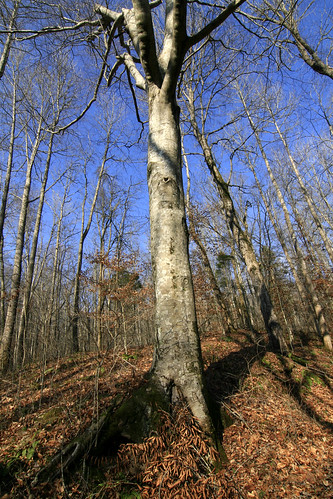
Waiting for spring...
(*photo credit)
March 10, 2024 Becoming an Activist Like Jesus
How can I be like Christ? The crisis today is that we hold back out of fear. We lack willingness to follow the prompting of the Spirit. Believing and loving communities profess a common creed and unite in worship to express their faith and love. However, communities of hope are far less easily defined. The prisoner behind bars with little hope of freedom or the hungry child in the sub-Saharan village with parents dead from Ebola may appear to have little hope, but when they await the Spirit acting within them then hope springs eternal. There are times when those who are free to act and not restricted must break that silence. Jesus Christ is that hope for all, the physically restricted (imprisoned, orphans and terminally ill) and the ones who have opportunities to fulfill that deepest hopes.
Liberation means breaking the bonds that close us off, opening us to act in spiritual ways. Even when someone is behind bars or on a hospice bed -- a joining of hopeful hearts, whether through active work or passive suffering, becomes a single act of saving our wounded world. We share a joint enterprise in and through Christ and so his coming is our hope realized in space and time. By analogy, we "incarnate" Christ (by being the type or embodiment of the Incarnate Mystery) in our own lives. We make Christ present through our actions; we offer the opportunity for Heaven and Earth to meet in visible form through our actions.
Now is the acceptable time! Now is when Earth and Heaven meet. Anytime we become deeply immersed in earthly affairs and yet do this in a godly manner, we participate more fully in the incarnate mystery of Jesus Christ. We are faced with climate change that is of human origin and we know full well that with determined effort on the part of all participants we could move to an energy economy that is far less hurtful. However, delaying the changes allows the profit-makers to continue in their greedy practice. To allow the privileged few to take advantage of this time and we do nothing is sinful -- and we are never allowed to foster such a sinful condition. To act and be like Jesus is to make Heaven and Earth kiss and the hypostatic union shine in our own imitation of Jesus God-man. Through grace we act.
Our action reflect our words, for we show that we are willing to make this more than an academic exercise of defining the Incarnation of God becoming one of us. By acting we say we will stand behind what we say and know to be true. Heaven inspires us and Earth calls us to do meaningful things. If we truly believe that God's creation is meaningful and worthy of preservation, we will act in such a fashion that will halt those who want to destroy this precious Earth. The seriousness of the situation calls us to break the bonds of paralysis and even at high cost and risk to ourselves do what is publicly needed to stop the disaster facing our world and to imitate Jesus in doing so.
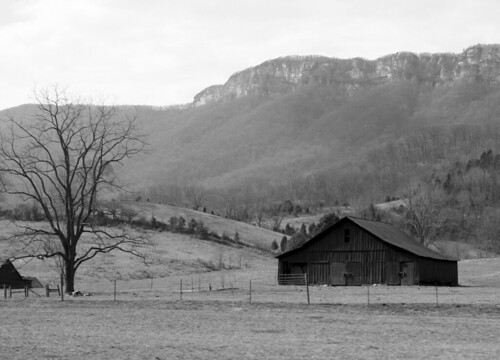
A rustic farm near Cumberland Gap, KY.
(*photo credit)
March 11, 2024 Comparing Acts of Charity and Social Justice
If I feed the poor they call me a saint; when I ask why they are poor they call me a communist.
Archbishop Hélder Câmara
It is simply easier to get people to donate to charity than to the works of social justice. Some with whom I am inclined to agree consider much charity to be pure Band-Aids. Certainly victims of emergency disasters (the burnt out, flooded, or drought-stricken) need immediate help. But folks inclined never to help improve their own lot are not always helped by charity. A balanced caregiver know when to help and when to refuse.
How do we apportion resources so as to address long-range social justice issues while still helping people in immediate need? Should our compassion and limited resources extend to deeper causes of poverty? Jesus as liberator confronting an oppressive System feeds the hungry and heals the sick. When do we feed multitudes and when do we focus on social justice issues?
Stay with Charity? We'll be judged on charity issues: "you fed me when I was hungry." However, social justice actions include getting at the deeper causes of hunger and so charity is not the only way to feed hungry folks. Certainly giving an immediate handout can be consoling to the giver, but is it not a certain exercise of power as though what we "own" is shared out of our largesse? We receive praise and are energized to pretend that it was or generosity and not because the food actually belongs to the other in the first place and we are liberating it for proper use.
Move to simultaneous acts? Certainly the hungry need to be fed today, not a year from now. Here again is the old adage about giving a fish and teaching someone to fish; but there is more. What if grounds are depleted due to overfishing by distant corporations? What if legislators are unduly influenced by the corporate fishing interests? Confrontation and efforts to bring about justice for the poor are time- and resource-consuming but must be undertaken by an aroused citizenry. Much depends on success in the long run, on clearly seeing the current injustice, on enlisting others to help take up the issue, on willingness to takes risks, and on seeking spiritual guidance.
We address food insecurity. Only in experiencing the poor first hand are we able to do both acts at the same time. Jesus both fed the hungry and challenged the System; so must we. We need to be sensitive to a dual focus of redistributing what surplus we have in hand, and in prodding those with storerooms to open them to the needy as well --even the storerooms of knowledge and resources to help the poor to furnish their own essentials. Charity without justice is unrealistic. Still, commitment to social justice issues alone without the empirical feedback of personal commitment to the poor is a lack of proper sensitivity. Solidarity teaches that when one suffers we all do.
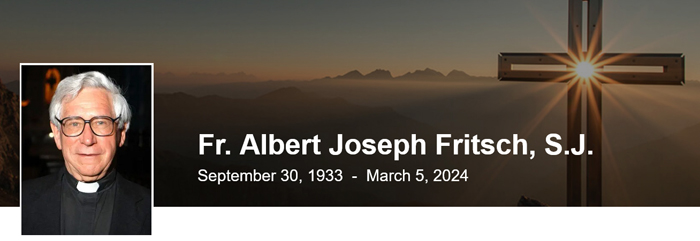
We invite you to listen to Fr. Al's final homily, as recorded to be played at his Mass of Christian Burial, March, 11, 2024:
Al Fritsch SJ Homily - Youtube
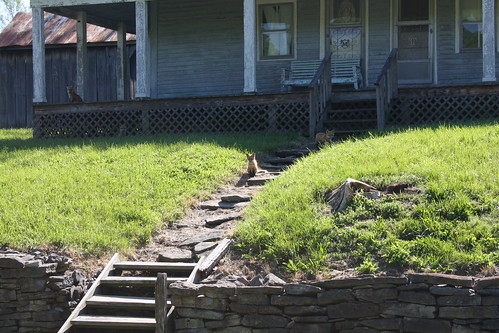
Young red foxes, Vulpes vulpes, occupy abandoned home. Anderson Co., KY.
(*photo credit)
March 12, 2024 Considering Pedestrian Rights
A few years back I returned to Austin, Texas (where I did my post-doctorate studies a half century ago), to perform an environmental resource assessment. During some free time I strolled over the same routes that I had jogged a few decades before, and found a much bigger city but still the same problem -- the city lacks sidewalks for strollers, walkers, and joggers. Granted, Austin is four times the city of my youth and has more sidewalks than in 1969, but it is still a motorists' place. As in much of America, if folks seek to get around without a motorized vehicle, they are at a massive disadvantage. Notices at Interstate entrances tell pedestrians to stay off; auto privilege creates a class system.
Automobiles and the power attached makes vehicle drivers a privileged class who may rule the day, and may even be tempted to run over you if in their way or challenge their sense of comfort. The car has so many advantages and yet numerous disadvantages (e.g., air pollution, petroleum depletion, parking demands, congestion, etc.). We seek a motorized vehicle, or else we are essentially stranded. The entire culture is geared to allowing the powerful motorized vehicle to reign supreme -- and to make those who are without to suffer through competition with speeding vehicles. In fact, in our rural areas transportation limitations are even more onerous than in congested urban ones.
A cruel exercise for the aged and which awaits me some day is having licenses revoked. An accepted "freedom" in mobility is removed and harkens back to days of youth when one could not yet drive. Of course some make it through life without ever driving, but they are a special minority. But are they? Count infants and youth, elderly, infirm, and many urban folks and the numbers mount. Many still move about, but their mobility is restricted because auto use limits their use of public thoroughfares. By old English Law one has a right to walk on roads. Many driverless folks are inconvenienced through dependence upon others for groceries, health services, or visits to the other places outside their strolling range. That restricted freedom is due both to limited physical mobility and by a privileged auto culture. Scattered and isolated, the driverless often feel marooned on islands between the torrential rivers of traffic.
The answer is certainly not to open driving privileges to youth and the senile. Rather, we need better services for the immobilized that require as much resources as to maintain an Interstate system: protected walkways, inclines, railings, and a multitude of ways to break isolation for a carless majority. We need at least the public transportation available in a train culture predating the auto, with its local service and stations. A wider undeveloped world plays catch-up by seeking an expanded auto culture. Who will stand up for non-drivers' rights?
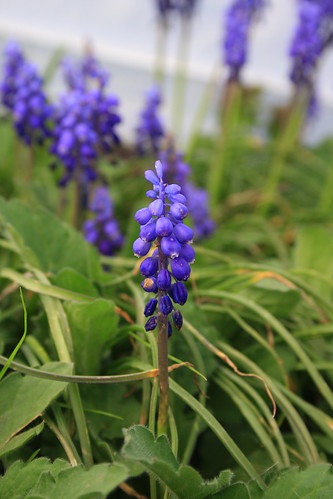
Container-grown grape hyacinths, to be transplanted outdoors.
(*photo credit)
March 13, 2024 The Healing Jesus
I order you: get up, pick up your stretcher, and go off home. (Mark 2:11)
I always feel utterly powerless when visiting the ill at a hospital. I would like to do what Jesus does and heal the person on the spot, but that is beyond my powers. Instead, I pray with the sick persons in my and their powerlessness. Isn't this their and my entry into the total suffering of the Christ of the world? Am I not invited to join with them in compassion and let it rest at that? The final outcome is in God's hands; we are mere instruments, but we are called to be healers nonetheless. I always leave the hospital feeling a little more healed myself.
A heavy portion of Jesus' recorded public ministry is consumed with healing and teaching the multitudes present, the disciples in particular, and the rest of us Johnny-come-latelies. Jesus heals a wide variety of ailments. He manifests his compassion, his power, and his teaching approaches in the healing process. Jesus bring a wholeness: physical, mental, and spiritual wellbeing, because the ill call for integrity and Jesus responds with each request. His healing is a sign that all need integrity. In fact, healing is one of the signs of the Messianic Age, the initiation of God's reign of love, justice, joy, peace, wholeness, and the conquest of evil powers at work in the world. Furthermore his healing acts are signs of the redemptive act to come to Calvary, where the entire world is healed through the blood of Christ. Jesus comes among his own to share our human condition and to fully endure our situation.
Healing by Jesus is not a wonder-working event; rather it is a learning opportunity. Thus, even in healing Jesus is called "Rabbi." Jesus teaches us through forgiving imperfections while also making whole the mental and physical conditions of the one healed. Spiritual healing is foremost and therein Jesus extends his compassion and mercy, qualities to always accompany the spiritual powers of healing. The burdens of the ill are lifted with the sure knowledge that Jesus heals us while we are still sinners. Jesus desires physical healing, but moral affliction far surpasses the physical need for healing. He is quick to forgive, and he sets up the time on Easter Sunday in which his disciples are empowered to effect spiritual healing whenever the opportunity arises. He organizes a healing Church with its sacraments of Eucharist, Reconciliation, and Anointing of the Sick.
Jesus encourages those with disabilities to praise God through their own acceptance in joy. He sees each person who is ill as someone of special importance, not a statistic. Jesus loves each and rewards with kindly attention. "Be cured." "Arise." "Sin no more." "Your daughter is healed." Jesus does not glory in being a wonder-worker through his healing; rather he wants to show something deeper -- God's power at work. God is the fullness of life who desires our wholeness as well.
 a14
a14
The delicate, intricate form of the Glenurus gratus (Order Neuroptera).
(*photo credit)
March 14, 2024 Participating in Healing
We follow in Christ's footsteps, seeing a primary role of healing to be restoring others to wholeness. We may not have the miraculous power of physically healing, but we can bring a spiritual wholeness to the world -- the primary level of healing. Through the empowerment of the sacraments, moral blemishes can be removed and new life offered. This is the spiritual realm of healing so needed in our world today. We become spiritually whole, which allows us to bear physical difficulties during this sojourn on our Journey of faith. We grow in the courage to live and die in the Lord. Then our own good deeds speak of an interior spiritual growth now willing to extend out to showing compassion for others.
We believe in healing. No one would enter the healing profession unless he or she really believes that recovery is possible and worthwhile. Spiritual healing extends to finding opportunities for wholeness. Unless we believe that we can effect healing in some way, the caregiver lacks the enthusiasm or the power of God within to touch others deeply. We fervently pray for total recovery, if that be God's will. Furthermore, we believe Earth can be healed and we are called to be healers of our Earth.
We hope for healing. Through the process of healing, we join in becoming healed ourselves. Part of the lack of internal healing is that we show our own confusion within the mystery of suffering and illness; we do not want to tarry in the face of affliction. Our hopes are that our own spiritual healing extends to caregivers as well as the afflicted. All, including Earthhealers, take a general Hippocratic Oath; we must do all in our power to bring healing to those within our hope.
We love to heal. Jesus teaches us to love the ones to be healed and work through the best healing process we know. We look at the conditions and judge our practices accordingly. "Look what they have done to my Earth." Jesus teaches us to heal gently, patiently, compassionately, lovingly. Hearts can be touched, for illness (and dying) affords a supreme teaching moment, raw material in the grand economy of salvation. Even without miraculous physical powers, we still participate fully in the miracle of life. Each time we bring wholeness even in some small way, we help heal a troubled world. Each confrontation with illness is an opportunity to reassert life through healing. So loving miracles occur in silent ways by the wonder working of a community of healers working in solidarity.
A world community works in the arena of discovering, researching, developing, manufacturing, and dispensing medicines for and to those who suffer and are ill. These brethren in the medical research fields have found many cures for diseases such as leprosy, which plagued people of Jesus' day. Their work is a continuation of the healing ministry empowered by Jesus. Research deserves our prayerful attention and proper monitoring.
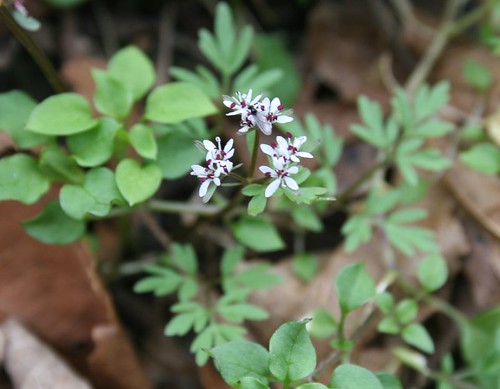
Arrival of the harbinger of spring, Erigenia bulbosa, early-blooming Kentucky wildflower.
(*photo credit)
March 15, 2024 Coming of Nicodemus by Night
Just as Moses lifted up the serpent in the desert, so must the Son of Man be
lifted up, that all who believe may have eternal life in him. (John 3: 14)
Renewing our lives is a Lenten theme, and a worthy goal for the time leading up to Easter. In fact, our self-denial and good works should prepare us for the celebration of that upcoming event. The transformation starting to occur in our landscape is a sign of the change of heart sought in Lent. We are seeking a rending of the heart, a fundamental change, a Metanoia. This is not just an individual need, but we as a people must rend our hearts as well.
Nicodemus, a leading Jewish Pharisee, comes to Jesus by night knowing it to be too hard to come by daylight, for he might be seen by his peers. He is determined to break with his culture but only gradually. Nicodemus wants to talk about a meeting of minds, but Jesus insists on a meeting of hearts, something far deeper. Later, in John 7: 50-51, Nicodemus defends Jesus, the accused Galilean, against his fellow Pharisees and we can infer that he is becoming a believer. Again he appears with Joseph of Arimathea after the crucifixion in taking Jesus from the cross for burial. Each appearance shows greater courage in appearing in public.
We glory in the cross of the Lord Jesus. As Lent reaches its climax, we again consider this sign of our redemption. In the Old Testament (Numbers 21: 4-9), Moses is instructed by God to have a bronze serpent raised before the afflicted people. Whoever looks upon it is saved. Here in the Nicodemus story the raising of Christ on the cross foreshadows salvation, for whoever looks upon this instrument of ignominy with reverence and repentance is saved through the graces of God. We show our public manifestation of faith when we accept the Cross and show others we do so.
Those in tune with the great outdoors are looking forward to the fullness of spring with open hearts. Renewal begins in our hearts through a rending process or an opening of the heart to the Lord, a renewal within. Do we allow the door to open and do we pray that God gives us the power to act? Certainly, rending the heart is a free act, though the power of God underlies our chance to do this; God owns our time and space and we are only renters and stewards. God gives us the grace to live and breathe and open ourselves for continual gifts of greater sorts.
God's gift of love is the Son; our acknowledgement is through opening our hearts to his advent within us. We cannot ignore this gift any more than the Israelites could forget what Cyrus did for them through God's grace by allowing a return to Jerusalem.
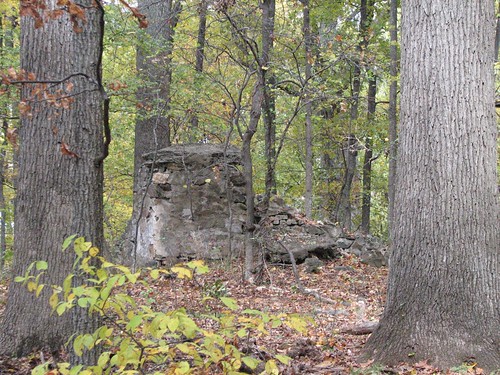
Ruins at James Madison Landmark Forest. Montpelier, VT.
(*Photo by M.E. Brett, Creative Commons)
March 16, 2024 Visiting James Madison's Montpelier
We have staked the whole of all our political Institutions upon the capacity of Mankind for Self-government, upon the capacity of each and all of us to Govern ourselves, to control ourselves, and to sustain Ourselves according to the Ten Commandments of God. James Madison
Last autumn I had the good fortune of being able to take off a day and go visit the birthplace and ultimate homestead of James Madison (our fourth U.S. President), with whom I have always had great admiration. I felt the need to know the community and landscape that shaped such a great person -- and in all respects it was a rewarding experience. We come to know much about people and their rugged character when we see what they saw while growing up and maturing. The freedom and tolerance of Madison sort of shows itself in the environment around where he flourished when not serving his country in New York, Philadelphia, and Washington.
James Madison was born on March 16, 1751 in Orange County in central Virginia near mountains and a river and among a prime forest in his day. The home of the plantation of his family has since been torn down and little remains of the site. But Madison lived and died at the newer homestead within a mile of his birthplace, a true stay-at-home for the most part. There at Montpelier he passed away after a rewarding life at age 85 in 1836. Due to the lack of proper attention and care by a stepson, the property did not remain long in the family and Madison's faithful wife Dolly had financial difficulties in her final years in Montpelier and Washington, DC after James' death. Glory passes!
With generous labors of love and proper funding grants the property that changed hands many times over the past two centuries is now in a specific foundation and has secured in the past year enough money to rebuild the slave quarters that were next to the main house. This will bring about an appearance quite close to the buildings and grounds as they existed while the Madisons lived there. The archeological work leading to this restoration is extremely interesting and, in fact, is ongoing at this very time.
The most pleasant surprise in the visit was the very wonderful old-growth forest that is next to the homestead. Enormous trees in the most captivating walking trail system greets visitors. Yes, these trees are grand and exist in a wide variety of native species (oak, maple, hickory, ash, elm, etc.) as well as some exotic species that are still healthy since the day of Madison's planting almost two centuries ago. In fact, at least three of the Montpelier trees are now determined to be grand champions of the Commonwealth of Virginia and others may be candidates. Truly, Madison was a great ecologist, a title given more often to his friend Thomas Jefferson and to Teddy Roosevelt.
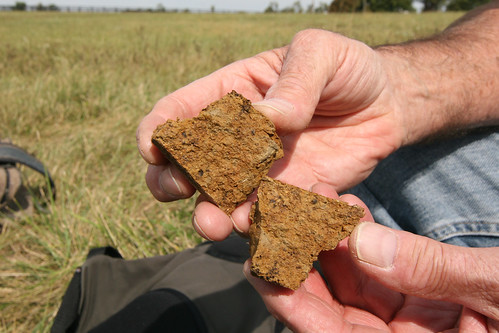
Manganese nodules in clod of Kentucky clay.
(*photo credit)
March 17, 2024 The Teaching Jesus
How blest are the poor in spirit; the reign of God is theirs. (Matthew 5: 2-11)
Who can really teach when syllabuses, grades, testing scores and academic credentials are the major concern? What about the learners? Do we forget what teaching is all about? I never consider myself to be a teacher and I suspect this has to do with the regimentation connected with the profession. This I did not like. My happiest memories are the courses in environmental science and earth sciences that I taught to the students in Jellico, Tennessee at the Mountain Women's Exchange; students were older mountain women wanting to get degrees through an accredited college (Carson-Newman). The program was not overly rigid.
The Beatitudes teach us that Jesus stands on the side of little ones, lowly ones, and the down and out. Each beatitude is a vision and promise of better times, a new period now coming where the forsaken receive their blessings -- and God reigns. The beatitudes relate to Jesus' own way of living and blessing through a Kingdom that is a prayerful hope emerging before us with eyes of faith. Through teaching Jesus proclaims the Messianic Age now arriving. We learn to live good and holy lives as we await his coming, for the present order is giving way to the new.
Exactly how this Kingdom will finally be shaped is uncertain, even though we are promised it will be based on justice. However, the transforming process involves us, for we are not mere observers; we partake in this sublime prayer, proclamation and teaching tool. Forgive us, we pray, as we forgive others. Teach us so we can teach others a program that shows loving concern and mercy, not violence and vindictiveness. We are urged to see this as an emerging kingdom, an ongoing current happening, and a future fulfillment of that which has already begun. We teach the addicted to the degree possible, but that is not an easy project.
Jesus also is patient and teaches the endurance of a good teacher; his parables are very down-to-Earth, as he gives us a blueprint for action. He teaches the multitudes in the fields and out-of-way places. As teacher, he shows the power of simple straight forward stories with application to all kinds of people. Parables touch everybody at their own levels. Jesus shows the patience of God of the Old Testament with a wayward and imperfect people. For instance, Jonah is not satisfied even when his mission to Nineveh is a success; God patiently teaches him that he must look beyond his small world and see God as merciful for all. The Good Samaritan parable show the neighbor to be one who bestows compassion for an unfortunate victim: salvation is for all. Each is a lesson teaching God's love, mercy, and concern.
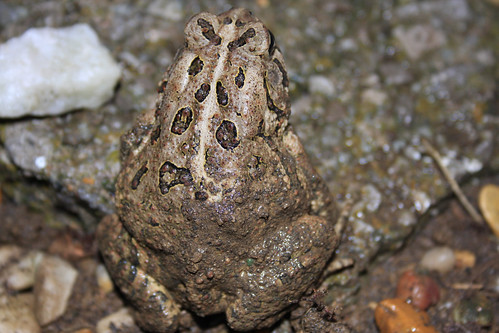
Counting warts and spots. Fowler's toad, Anaxyrus fowleri.
(*photo credit)
March 18, 2024 Applying Jesus' Teaching Methods
How do we teach in an age of consumer addiction? Can those so addicted be responsible students? This can only be done through the power of Jesus as teacher who is capable of changing hearts and minds. Jesus is not in favor of empty titles and pretentious honors -- "your excellency," Professor, academic gown, learned degrees. Jesus is divine and his message is both eternal wisdom and teaching that is urgently needed and timely now. We take our teaching role seriously and see that it is godly to impart wisdom to others, and that this must be done expeditiously and clearly. We find in Jesus' approach a number of aspects worth imitating within the context of our culture and current situation:
* Teach anywhere freely -- Jesus teaches the multitudes where he finds them -- in the open fields, in the Temple precincts or in small groups as his disciples. He holds teaching in high regard and so should we. In being like Jesus we need to accept that teaching can be anywhere -- in the openness of nature, in the more formal settings of lectures, and with individuals and small groups. We do not have to await a multimillion dollar classroom facility. Teach while traveling; teach on the Internet; teach while living and dying courageously. Jesus does not take up a collection; if there are expenses try to share them.
* Teach creatively -- We should respect teaching even when we rebel against the over formalism of the current educational enterprise that can hurt students and drain teacher enthusiasm. Jesus teaches in parables that reach the masses in different ways. Examples ought to be concrete even when we move to rather complex issues. And that is the challenge in this current writing.
* Teach everyone simply -- Some ask with a touch of impatience, "Who is your audience?" When it comes to environment and the Earth, every human inhabitant of the Earth is the audience. However, some can read and some cannot; some are quite bright and some do not know the left hand from the right; some make themselves illiterate through television addiction.
* Teaching with patience -- Teaching people of different cultures means having an acute awareness of the various ways people learn and process information. At first the temptation is to give up, but with patience and endurance we learn how to teach. It's hard not to confuse or overwhelm the whole host of students or to tailor remarks to those more inclined to respond.
* Teach Good News -- We are impelled to go out to all the world and spread the Good News through teaching, proclamation (homily, sermon and formal speech), prayer, encouragement, and giving information and publicity. In so teaching we learn, just as missionaries receive while delivering. To picture ourselves as exclusive teachers, and others as total learners is elitist.
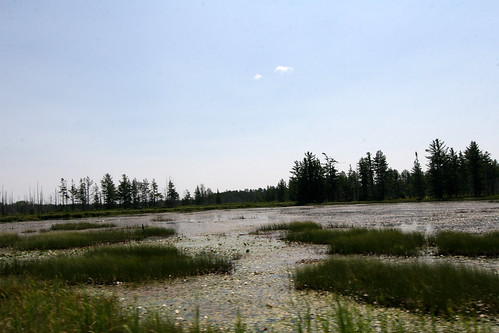
An expanse of wetland, upper peninsula, Michigan.
(*photo credit)
March 19, 2024 Pondering Once More Who Is This Jesus?
On the Feast of St. Joseph we join all believers in asking Who is this Jesus? We search into the backgrounds that make us who we are. Luke and Matthew infancy narratives are not biographical but theological. Still Joseph Fitzmyer says that there is a historic nucleus to those parallel stories: the reign of Herod, the virgin Mary, Joseph being of the House of David, angelic announcements, Jesus as Son of David, the Holy Spirit, Joseph not being involved, the name "Jesus" as Savior, the birth after Mary and Joseph came together, the birth place of Jesus in Bethlehem, and the childhood in Nazareth.
We know that in that long hidden life Jesus progresses and so ought we in coming to know him. Meanwhile the child grew in maturity, and he was filled with wisdom and God's favor was with him (Luke 2:40). After his venture in the temple showing a growth in his own human progress we know little more. He then went down with them and came to Nazareth and lived under their authority. His mother stored all these things in her heart. And Jesus increased in wisdom, in stature, and in favor with God and his fellow human beings (Luke 2:51-52). And who would expect that after such an awesome preparation for his coming, the Christ would live about 90% of his life in a hidden way. Abraham Lincoln summed up the history of his own youth as "I was a poor boy." All the more, it can be said of Jesus who humbly performs many routine activities: studies, helps as a carpenter, and performs a multitude of chores belonging to simple small town life in Galilee.
Jesus matures. Since he is divine, all he has to do is tap into his infinite store of truth and bring it out. However, Jesus is human and undergoes a normal maturation process in ways that soon dip into pure speculation. He starts his public ministry by attending his Cousin John the Baptist's baptismal rites. The Gospels bring out his movement from hidden to fully public life. St. Luke's Gospel is coupled with the Acts of the Apostles. In the Gospel, Jesus grows in age and wisdom (a growth in consciousness of the mission involved); in the Acts, the Church advances in age and wisdom (an awareness of itself) through events in which the number of believers increases. Jesus starts at Nazareth and proceeds to Jerusalem with an emerging ministry; the Church starts at Jerusalem at Pentecost and proceeds to Rome, learning all the way.
Our lives are also a journey of faith, a growth in consciousness over time. We imitate Christ in coming to know ourselves and really in a journey of coming to know him as well; his faithful obedience to a pattern for us to follow. He overcomes temptation and he persists in ministry through constant prayer to the Father and reaching the climax of his ministry during his agony in the Garden. From youth to the moment of suffering and death, obedience to God's will stands out -- "not mine but thine be done."
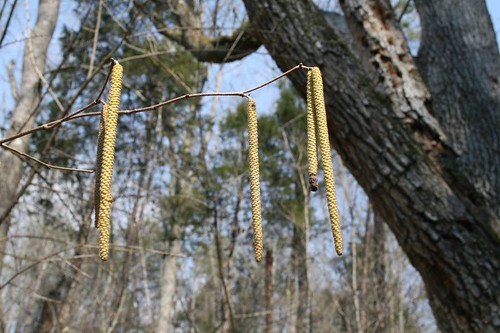
Mid-March flowers of the hazelnut, Corylus americana.
(*photo credit)
March 20, 2024 The Liberating Jesus
The spirit of the Lord has been given to me,
for he has anointed me.
He has sent me to bring the good news to the poor,
to proclaim liberty to captives
and to the blind new sight,
to set the downtrodden free,
to proclaim the Lord's year of favor. (Luke 4: 18-19)
When I went to Washington in 1970 to work on environmental issues I joined Ralph Nader's Center for the Study of Responsive Law. One of Ralph's cautions to co-workers who were dealing with public interest issues was never to take even a cup of coffee from a representative of a Corporation. A fellow chemist and kindly gentleman arrived in DC and asked to talk about the environmental crisis. We went to a local diner over a cup of coffee. A while later his company became involved in a pollution battle; I disregarded the issue in favor of other pressing matters. Later it occurred to me that my dismissal was due to that cup of coffee.
Jesus enters the synagogue of his home town of Nazareth and makes his public mission statement quoting the prophet Isaiah (61:1-2). Jesus publicly announces that this text is "being fulfilled today." He places clearly before all to see the HERE (Nazareth), the NOW (his public ministry) and the WE (his audience of local folks). He states that no prophet is accepted in his own country and the crowd seeing his universal message becomes so incensed that they act like a mob willing to kill him. Jesus' mission is to proclaim Good News, a "Yes" with its sparks of fire; the native folks’ rejection is a "No." However, Good News demands change, an internal reform and abandonment of old ways; self-liberation is utterly needed.
Jesus evokes hostility that will grow as he approaches the seat of political and religious power -- Jerusalem. His herald, John the Baptist, is first imprisoned and then killed; the Scribes and Pharisees shadow him, try to trip him on allegiance to Caesar, show discontent with Sabbath healing, point out failures of his friends and disciples, are determined to stop him after the Temple cleansing, and regard his association with the Father as blasphemy. That hostility beginning in Nazareth reaches a full fury by the arrival in Jerusalem. Jesus is willing to confront and face such difficulties. He shows both compassion and righteous anger.
The liberating Jesus inspires us to confront the System, as it is overly controlling and unwilling to act responsibly. Yet corporations have been designated with certain "rights" of a person. A true farce! And these agencies are devoid of personal responsibility. Becoming globalized, they are able to shift funds across borders with impunity. Liberation from this oppression is called for and we are the ones who have to be the liberators.
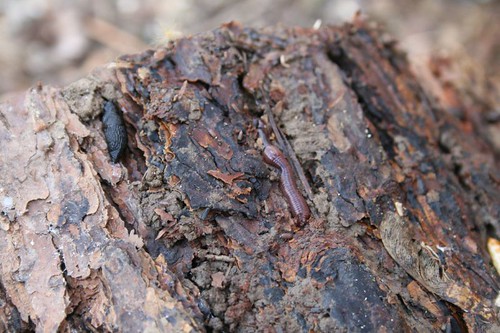
Emergence of earthworms as spring approaches.
(*photo credit)
March 21, 2024 Self-Control is Personal Liberation
Lent is a time to reestablish our spiritual equilibrium; this involves self-denial and resistance to the materialistic culture and the insatiable appetite created for consumer products. Through Lenten exercises we can convert our own bodies into more ready instruments for the Lord's work. With divine help, the control of self can be achieved through different forms of regimentation and discipline: fasting for periods of time; abstaining from certain foods such as meat and processed sugary foods; milder forms of mortification such as restricting ourselves from extra snacking, TV watching, or computer games; and engaging in additional positive acts such as visiting the sick or spending more quality time with loved ones. Taking on an environmental issue in place of leisure can become an exercise in self-control.
All of these methods that do not do physically harm can help liberate ourselves from the forces around us. Spiritual directors (including St. Ignatius, who performed severe acts of mortification when younger) discourage excessive fasting from food or drink that could harm our performing a high quality of work. When these only enhance our control of appetites they should be encouraged. The actual choices depend on what the Spirit directs us to do. Fasting from food is healthy, both physically and spiritually, even though some of us find this difficult to do. Yes, the stomach needs a rest at times and we need to learn to refrain from otherwise tempting good things.
A healthy focus on personal liberation could give way to a consuming practice of mortification which is shortsighted. Over-focusing on individual imperfections stops us from a broader look into the society in which we live. Corporate wrongdoing is rapidly emerging as a major problem because of the vastly increasing power of multi-national economic institutions. They captivate the media and highly influence the culture in which we are immersed. We are being manipulated and soon lose our sense of self-control.
In my late teens I was drawn by TV ads and peers to smoke - an addictive substance abuse; this realization now must extend to overuse of drugs, whether illegal or prescribed ones.
Personal liberation extends to other issues: our own material wants in a consumer product-filled world; the attention to possess and use vehicles and electronic devices; the place of silence in our lives and that of our neighbor; and our use of energy.
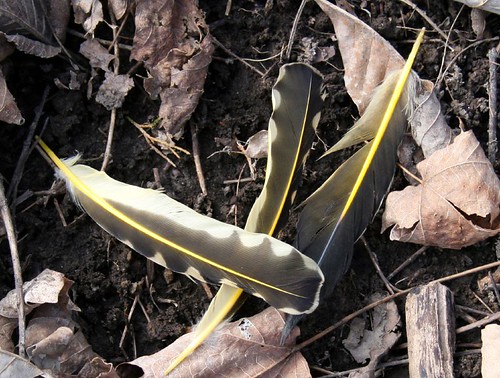
Feathers of the evening grosbeak, Coccothraustes vespertinus.
(*photo credit)
March 22, 2024 Sacrificing for Others is Mortification
I tell you most solemnly, unless a wheat grain falls to the ground and dies, it remains only a single grain; but if it dies, it yields a rich harvest. (John 12:24)
As we approach Good Friday in less than two weeks, we find Jesus instructing his disbelieving and confused disciples as they approach Jerusalem. He speaks of hating one's life, which means being willing to sacrifice one's life for a greater cause. And this is precisely what Jesus does at this time. This makes his disciple ask questions, "Why is he doing this?" Isn't the Messiah to be a leader of liberation?" "Why not violent revolution?" The image of the grain's dying to self for the production of something greater (a fruitful harvest), is Jesus' way of instructing his followers in the need to be self-sacrificing for a future good that will be most bountiful through selflessness.
Create a clean heart in me, O God. We know that the narrative in the Gospel has an eventual fulfilling message. The promise expressed by the prophet Jeremiah (31:31-34) is that God will place "my law within them, and write it upon their hearts." The law of self-sacrifice is not something that need to be taught to kin and friends, for all know how to act through their conscience. God's promise includes forgiving evil-doing and remembering sin no more. This promise shows us that we too, just like Jesus, are to be prepared for what is to come -- the impending clouds of our own suffering and deaths. With a clean heart we give up attachments we hold so dear so that we can come to the Lord in anticipation of God's glory. Through a clean heart we await his coming and show a willingness to endure what is in store for us no matter how difficult it appears at first.
We are sometimes in rare moments of life called to sacrifice for others. To the degree we can give up our own attachments, we can make this a meaningful sacrifice. Still we must respect our own needs and choose proper nourishment and rest for the sake of self and the other. Throughout history, some heroic souls have made immense sacrifices, even at the cost of health for the sake of loved ones. Care for our own health is expected as part of the total testimony but we must listen to what is the care we need. The act of sacrificing is a metamorphosis, a change in our being from a spiritually immature to a more adult stage -- a clean heart.
Sometimes as in the case of St. Theresa the Little Flower, we will not see results of our sacrifices in this lifetime. She prayed that she could bring good things to others after she passed from her very short life -- and that certainly happened through many wonders and miracles. In some way, every one of us who seeks to do good things, whether educating children or building some enterprise, expects benefits will endure long after we are gone. That is what dying as grain to produce a harvest is all about.
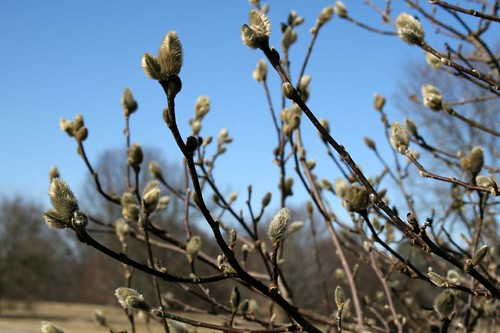
Buds of spring, to be opening soon.
(*photo credit)
March 23, 2024 Reflecting on the Coming of the Lord
Through him all things were made. For us and for our salvation he came down from heaven:
by the power of the Holy Spirit he was born of the Virgin Mary, and became man. The Nicene Creed
We follow the incarnate Christ, who is the Father's own affirmation, responds to our needs, and is involved in the struggles of our human family. We Christians hold that Jesus Christ is God-Man and that this deep mystery is tightly bound in our common creed and in the prayers we pray privately and publicly. Our reflections strive on occasion (and especially during this Lenten season) to focus on this deep mystery of who Jesus is and to make this understanding enter into our way of acting.
We human beings are not totally autonomous from other Earth creatures. However, being different we can freely say "Thank you" to God and, thus, created in the divine image we are invited into eternal life. Yet, together with this profound destiny we are also closely related and interconnected with other creatures of the Earth. We seek nourishment, protection of the young, and a quality habitat. We are defined by our presence on Earth and so it enters into our destiny in some fashion.
Because of God's great love for us we have received the gift of Christ: Divine Son, Eternal Word, Incarnate, Healer, Teacher, and Liberator. Truly wayward human beings waited a long time for the Christ, a God-given promise. During this long wait God prepared a chosen people among whom the Messiah was to be born. After millennia of preparation a faithful remnant awaited the coming event all the more eagerly. Key happenings occurred: the promise to Adam and Eve, the Covenant with Noah, the Promise to Abraham to be father of the race, the Exodus or liberation from captivity, the Mosaic Law, the Davidic Covenant as to the Messianic lineage, the Captivity in Babylon, the building and rebuilding of the Temple -- and finally the coming of the Messiah, the Christ. It was both an event and the culmination of a historical process, a "messianic gestation."
From what we can perceive now through advanced scientific knowledge, this process of advent extended back through human and pre-human history to the very origins of the universe itself. This coming is "Salvation History," what Karl Rahner (The Trinity, p. 5) calls "the domain of God's self-communication, specifically, God's self-revelation and activity through Christ and the Spirit." Christ is the first-born of all creation (Colossians 1:15); He was with God in the beginning (John 1:2). We prepare for the Incarnation event once more and so proclaim the God-Man in our midst. We do so with deepening faith and eager expectation. Emmanuel is with us and this allows our longing to be satisfied.
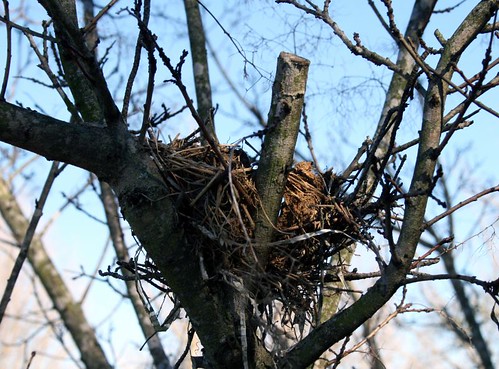
Sturdy nest against blue skies.
(*photo credit)
March 24, 2024 Speaking the Word
Send Victory like a dew, you heavens,
and let the clouds rain it down.
Let the earth open
for salvation to spring up.
Let deliverance, too bud forth,
which I, YHWH, shall create. (Isaiah 45:8)
The angel announces Good News that the Eternal Word is now among us. A new age dawns and Mary becomes the focus of attention at this blessed moment. We have our God among us and we dare to follow Mary in saying "yes" to the unfolding mystery. Mary in her transparency and purity speaks for the whole human race. We stand beside her accepting the divine Word and presenting him to others. While we do not physically bear Christ through the gestation period, we carry the gift of Christ to others when we bear Good News, Word being incarnate.
God reaches down ever so gently; Earth, personified in Mary, springs up with a "yes," and deliverance occurs. From Mary's human womb "buds forth" a savior. This imagery is the opposite of what some painters depict, e.g., a richly decorated Mary prayerfully meditating on the monumental event of the Annunciation. Rather, hers is a joyful response but one filled with the need to be of service to her cousin who is with child in old age. God being with her in a special way is magnified by a journey to help another -- a sense of selflessness and a dynamic moment to share Good News.
God speaks in the person of Jesus. Hollywood theatricals would have been quite different, but that is not God's way. The Holy One wanted no parade of a political Messiah with sword-wielding angels slaying the Roman legions. Even his disciples still had such grandiose messianic expectations at the time of the Ascension. The alternative involves humble people who now see that the lowly are exalted (Luke 1:52), a radical democratic, grassroots movement from bottom up, and now becoming incorporated within our Christian political aspirations -- though it has taken centuries of struggle to be realized.
Women show a uniqueness in a humble way of healing, their grace and their courage is central to the drama of Incarnation. Mary is the prime collaborator in the great mystery of redemption, the one who says the ultimate "yes" to God, "let what you have said be done to me." (Luke 1:38). She becomes Theodokos -- the bearer of God; she is full of grace, mother of the Savior, New Eve, foremost model of all women, central receiver of the Good News; and her affirmation is an acceptance from the fullness of freedom in her heart. Her prayer of joy, daily Church recitation, is one of the most revolutionary responses in human history -- the hungry filled with good things and the rich sent away empty (Luke 1:53); all generations will call her blessed, because God has done great things for her, (Luke 1:48) -- a person of utter humility.
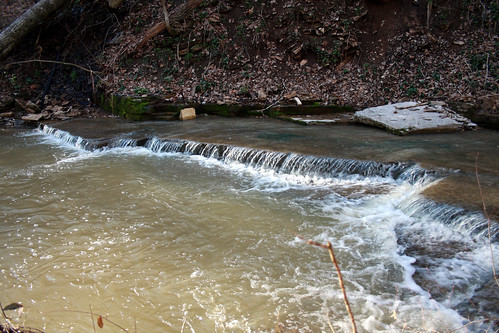
Rushing spring stream, Watts Ferry. Woodburd Co., KY.
(*photo credit)
March 25, 2024 Celebrating the Incarnation
In our own time, the last days, God has spoken to us through the Son...appointed to
inherit everything and through whom he made everything there is. (Hebrews 1:2)
Incarnation is listening to the word spoken in our hearts; in hearing that word we look out and see the location of its birth in our individual stable and among our limited shepherd friends. We hear the Word; we give it flesh with our own special earthly experiences. The inspiration is divine; the means of making it visible takes all my own human power; both are within my person as activist; both help make me a person with a compassionate eco-spirituality. My inspiration needs to be enfleshed; my flesh needs to be inspired. Both must be simultaneously present in the same person if we are to be like Jesus. Incarnation involves seeking and finding in the same person the human experience and the divine inspiration. Then we become Christ to the hungry and oppressed.
Jesus is God-Man and the hyphen has been the focus of centuries of battle in theological controversy. How God? How Human? How both? We do not want to retread old battlefields and accept that progress has been made. In a spirit of conservation consciousness we become armed with old knowledge and prepare ourselves to engage in new struggles. We are to be like Christ, and that is to take on his way of acting. We as believers are human but reborn into the divine family, a family of compassion and profound activity. We take on the divine character of Jesus, not only individually but also as the Body of Christ, the corporate presence of Jesus in the world around. Yes, we are a human church and we emphasize this fact often enough when our individual or collective faults are revealed. But we are called to destiny that is beyond the Earthly. As we imitate Christ, who is divine and human, we ought to fashion our radical compassion to be human and godly; we have immediate earthly concerns and an eternal destiny.
In the spirit of the Incarnation event we look down and see the Earth; we look up and see the transfigured Jesus, a consolation for us all. The reality keeps our feet firmly planted; the vision allows us to remain enthusiastic and still center at least momentarily on the union of Heaven's destiny and Earth's experience within ourselves. Lent encourages us to see the bigger picture and refrains us from being too narrow, whether inwardly, outwardly, upwardly, or downwardly. We are willing to be cautious and gaze in all directions before we cross over into action. Patristic writers call this bonding a wedding of Heaven and Earth, of God and human beings, a "cosmic communion," which extends now to the community of all beings. The event is the NOW; the HERE is Nazareth now extended to the whole Earth; and the WE are the participants in the cosmic communion, the act of announcing Good News to all. See Psalm 85.
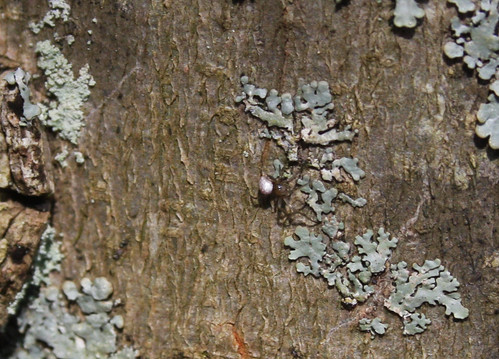
Spider, almost invisible against lichen growth.
(*photo credit)
March 26, 2024 Presenting the Divine and Human
YHWH created me when his purpose first unfolded,
before the oldest of his works.
From everlasting I was firmly set,
from the beginning, before the earth came into being.
(Proverbs 8: 22-23)
For youth, birthdays come after long anticipation, for they do not yet have the relatively shortened spans of accumulating lifetime between each event. Longing and awaiting are part of the celebration. Only my tenth birthday was punctuated with a party. After treats, my friends and I were driven to Maysville and we spent the afternoon on a bluff overlooking the German prisoner of war camp where we watched the prisoners play soccer -- a game we American youngsters knew absolutely nothing about.
With reverence and reluctance we tiptoe into the sanctuary of the Incarnation mystery. To "incarnate" (a theological and not a strictly biblical term) means to be endowed with flesh or being a living example of or personified. From a theological perspective, "incarnation" means "the Word was made flesh, he lived among us" (John 1:14); the dictionary says incarnation is "the effectuation of the hypostatic union through the conception of the second person of the Trinity in the womb of the Virgin Mary."
Mary conceives and bears a son who is the divine Word, a person with a union of a wholly divine nature and a wholly human nature. For some, these concepts are unfamiliar terms cast in centuries of extreme controversy involving leading intellectuals in the early Church and resulting in councils or gatherings of bishops on these weighty matters: Nicea (325), Constantinople (381), Ephesus (431), Chalcedon (451), etc. Readers are urged to read further into this early Christian history, for in so doing we become more acquainted with the Jesus who we follow and who had become the intellectual quest of wise thinkers. He does not arrive in Elijah's fiery chariot in the advent of other warlike gods. Rather the Word comes as gentle rain on a parched Earth, and all of us are invited to spring up as fragile and expectant blossoms. We peer down into the Earth, into a cave, and see our God coming to us, not in noble and regal attire, but as a tiny fragile being, an infant in swaddling clothes, a young person finding himself, and an adult who heals, teaches, and confronts an unjust system.
We have only our human nature and yet through Baptism we have been invited into the divine family. Thus we need to be immersed in the world and engaged with those seeking justice and mercy for all, and we have an invitation to be like Christ with a touch of the divine within. We are his follower, companion, and even his arms and legs. We grow and mature and thus must take on a godly character, with our eyes cast down to Earth and up to the Heavens. This takes great focus, for we are concerned about the Earthly and yet firmly fixed on the Heavenly.
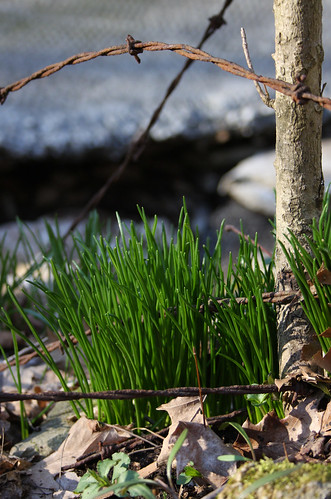
A tuft of fresh, spring grass emerges along barded wire fence.
(*photo credit)
March 27, 2024 Entering Jerusalem as Spectators and Participants
Hosanna! Blessings on him who comes in the name of the Lord! (Mark 11:9)
As we prepare for the drama of Holy Week we find ourselves being both spectators and participants. Jesus' grand but still quite humble entry into Jerusalem fulfills Psalm 118:25-26. While a fulfillment it is the moments of his full giving of self for the redemption of the world. We recall the many occasions in which we look upon the events in Jesus' life with varying degrees of participation and with more emphasis on the role of a spectator at a grand event of salvation. With time the disciples grew from learners to leaders in the Church, a road to ever greater participation allowing for Jesus to enter more into our lives:
* The Annunciation/Nativity is God's grand entry in an awe inspiring event, in which we listen to the words of Gabriel in conversation with Mary (prepared for this event from her birth);
* The Visitation is Christ's entry to others and it evokes a sense of utter joy with Elizabeth's greeting and Mary's response;
* The Nativity allows humanity's entry through adoration with the simple shepherds and Magi and beyond;
* The Presentation is a Temple entry when an old order passes in utter gratitude, Now, Master, you can let your servant go in peace, just as you promised... (Luke 2:29);
* The Baptism when Jesus enters into public ministry includes the divine words of encouragement from heaven;
* The Entry into Jerusalem is on a donkey and the hosannas of bystanders will turn by week's end to "Crucify him;"
* The Cleansing of the Temple is the remote preparation for the solemn events that will follow later in the week; and
* The Betrayal, Suffering and Death when hidden in utter fright the disciples show a lack of participation.
Each of us can move along with Mary and the Holy Women and John the Apostle to the scene in utter desolation. We can choose the time to be adoring and praising spectators and the time to partake in the events with our whole being through compassion -- suffering with another. The coming Calvary event extends in space and time and so we are called to come close to the cross and suffer with the Lord in among those of our brothers and sisters who also suffer today. We enter the divine mystery of salvation history that extends to all the world. We do more than observe, though this is hard enough, by our presence at Calvary.
Are we with Jesus as he enters our Earthly scene? At the crib and at the presentation? At his baptism or Cana or throughout his ministry? Do we run like the disciples and hide or stand with Mary and John? Do we present ourselves at the liturgical events of this Holy Week? Are we willing to grow in fidelity and sing hosannahs and go beyond with Jesus to Calvary -- that now includes a suffering world? Are we willing to really participate?
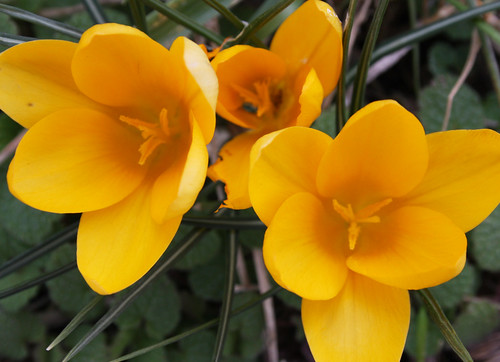
Surprise finding of crocus in bloom at old homesite.
(*photo credit)
March 28, 2024 Celebrating Jesus as Priest
At the Last Supper event, Jesus tells his disciples that this is a farewell. The Passover is reenacted in all its detail -- so very close in practice and spirit to our daily Sacred Liturgy: psalms sung, Scriptures read, homily shared, blessings of gifts, breaking of bread, and communion with those present. However, Jesus washing feet signifies humble service he expects of his disciples; he is priest now at an unbloody sacrifice.
During this Last Supper, Jesus delivers his Priestly Prayer (John 17), which is directed also to you and me. Jesus shows the infinite Father's love now to his disciples. Does it mean as "much as you (the Father) love me," which is infinite love? We ponder the depth of that love taking an eternity in our growth. I pray not only for these (the disciples), but for those who through their words will believe in me (17:20). We are recipients of these words in space and time. "Those" includes us, and all the others so that all might be one in him. This striving for oneness encourages us to love in the same way --love of lover and beloved.
Divisions, especially among Christians, distract from the course leading to this love. Thus, part of the sacrifice on our part is the priestly work of healing divisions that separate us from each other. The utter competitiveness among believers of various shades infects us; we attempt to show ourselves different from others, and that they lack something that they need to achieve through us. Really it is God's work, not ours. We tolerate greed while knowing that only loving and sharing brings togetherness.
Our loving God shows us the oneness of the bond of Father and Son: "and that the love with which you loved me may be in them, and so that I may be in them." (17:26). We are bonded in Christ and become one with him as we love each other with the love he gives to us. Differences will not overwhelm us, for that love becomes the glue binding us; his sacrifice is the magnet drawing us together again. Our vision is loving unity, something not yet achieved, but attainable in time. Earthhealing then becomes a grand priestly act of rebinding into a New Creation.
God's special love extends to the far reaches of the universe. God loves us all: kin and friends, distant strangers rich and poor, especially the poor -- the biblical anawim, who include all living creatures (this means the endangered and threatened plants and animals as well as humans who suffer). Loving all on our part is to participate in the depths of divine love growing in our hearts in unison with the Father. As we look upon Jesus, the suffering servant in his priestly role, we see our own role of imitating him, of willing to sacrifice for others.

Ladybird beetle's journey across the landscape.
(*photo credit)
March 29, 2024 Being with Jesus at Calvary
Imagine the sounds of Calvary with a jeering crowd, the boisterous, jostling, and irreverent conversation of guards. Yet in the shadows are the few who pray in silent whispers. The terrifying scene is nearly beyond our imagining: the dark clouds are swirling in a foreboding manner, punctuated by lightning flashes all about; Earth trembles knowing a monumental event is now occurring; the odor of sweat, unwashed, and the garbage heap called "Calvary" swell up; the taste is one of sour wine and death.
We look out in time and see death scenes a billion times; we hear those who suffer in their final agonies, some with labored breath and some through habit or impulse with curses or taunts; we smell the scent of blood and gore; we feel the crescendo of dramatic moments coming to few, to many, to all. The final curtain call of life and the ultimate autumn call of peoples form a chorus of woe. One hundred thousand people a day come to the most important moment of their lives, that day written on granite slabs in stone-forested cemeteries. We turn back again to Calvary to hear his final words:
"You will be with me in paradise" hears the one who stands up for justice and knows that there is nothing to take beyond death's door but the love stored up over the years, or its lack;
"Why have you forsaken me?" plead the abandoned, the homeless and the refugee, the ones with no place to turn to or go;
"Forgive them" pray the bloodied victims of abuse of many forms, but who still have the sense of mercy in their hearts;
"Here is your mother," offers a dying AIDS or Ebola victim to her whimpering child soon to be among millions of orphans;
"I thirst" comes from a million parched throats and those who would die to have one more addictive drink;
"It is consummated" mumble those on battlefields, in cancer wards, and among those on hospices' beds; and
"Father, into your hands I commend my spirit," are the final words of people who have courageously battled wasting diseases and who know the end is at hand.
All is silence now, blessed silence, when we pay respects in nods and hugs and few words, for we are speechless in the midst of death that has occurred, and with fleeting memories of a life spent in total sacrifice. Jesus dies. Earth is exhausted after its own upheavals and convulsions, with a silence of anguish.
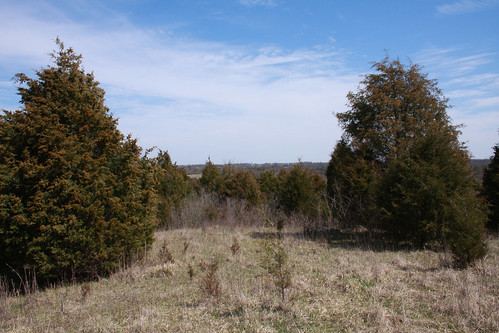
Blue Kentucky skies of March.
(*photo credit)
March 30, 2024 Celebrating the Mystery of New Life
The lamb that was slain purchased us with his blood from every
race, language, people, and nation. (Revelation 5:9)
Sister Imogene, my first teacher of seventy-five years ago (who lived past one hundred), taught us catechism. She asked us second graders for an example of a "mystery," and I told about my mother's chicken incubator in our basement in which all the eggs, though laid at different times, hatched on the same day. The mystery of new life is still a mystery to me. However, the hatching key was a little kerosene lamp, which was lit at a certain time. But when as a seven-year-old I wondered why, my question became part of my search for God, to ask why?, why?, why? Lord is there new life? The new-born chicks, which filled our house with musical sound, gave us that joy of emerging life.
New life comes at a price; perhaps it need not, but such is life! Our redemption into new life has certainly been paid for by the blood of Christ at a great price; this manifests God's great love for us. We are receivers of this act of love, which we do not deserve. We have received first life and now the promise and hope for eternal life -- an event to celebrate.
This Easter morn, sunlight first appears and streaks across the skies at the international dateline onto the Pacific Isles, the Indonesian archipelago, the Philippines, Indo-China, villages of China, hamlets and teeming cities of India, holy Jerusalem, a troubled Middle East, humble abodes of Africa, Gothic cathedrals and towns in Europe and then to our Hemisphere from the glistening Arctic ice-fields to Chile's tip, and on to Hawaii and Easter Island. At all these locations, two billion believers awake to the smell of incense, flowers and the new fire with words on their lips, "Christ is Risen." We greet Easter's dawn, in a 2,000-year- old tradition in an enthusiastic present tense, "Christ is risen." We are a new Easter People. We welcome the season of freshness, vitality, forgiveness, and openness to new life.
Easter fire and Easter water. They seem so opposite, for we quench fire with water and we use fire to boil water. As human beings we are drawn to both these "elements" as if our primeval instincts are still at work. That first discovery of fire made us masters of this tool, for fire has fascinated us as "enlightened" people ever since. Likewise we emerged from primeval water, but harken constantly back to its sound and its feel (see Appalachian Water Reflections). We find Christ in the new fire coming to life; we are washed in water and emerge out of it as new people, baptized into his Body. With fire we light our individual tapers and a Paschal Candle; with Easter Water we bless all around us.
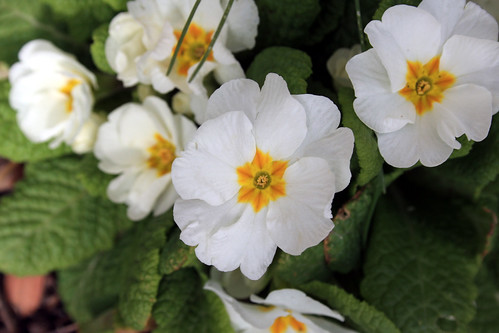
Primrose in the garden.
(*photo credit)
March 31, 2024 Engaging in Radical Compassion
Christ, the perfect ecologist, comes among his own, and his own do not receive him. This actual rejection does not change his modus vivendi. Jesus teaches us to buck up our courage. Let's act like him: feeding the hungry, teaching the ignorant, and directly challenging the System. We journey with Jesus to Jerusalem and, like Jesus confronting his broadening mission we deepen our own compassion that reaches beyond assisting people who are hungry or homeless; we make a first attempt to look into the causes of hunger and homelessness and the causes of the environmental crisis. Our sense of mercy opens the door for the simultaneous challenge within our participatory democracy: we see and interact with people in need; we enter more deeply and publicly into their own suffering through a growing solidarity; we experience their pain.
Winter's compassion involved seeing the needs of all creation and taking steps towards bringing healing. A lively spirituality in the face of desolation makes us willing to confront this troubled world. In springtime we become more willing to confront the aggressors, the polluters, the ones who cause the damage and desolation. A shallow compassion overlooks the oppressor and focuses only on the one suffering, as though bandaging the effect will treat the cause. A Jesus-based deepening compassion embodies both mercy for the victim and righteous anger at the culprit. Compassion becomes a balm that soothes and heals; it is also a laxative that starts deeper things happening; it can become the glue that binds a People of God together.
We now see more deeply into the question of who this Jesus is: namely someone who can be both merciful and angry at the same time; he is willing and able to express either emotion when necessary. Jesus may cry over Jerusalem, and become angry with those who cause it impending destruction. Now we walk with Jesus in the palm-strewn streets and approach the April of eco-spirituality, the compassion of suffering unto death. A radically compassionate eco-spirituality is not a juggler of two balls at the same time. It is the adept ability to be mindful of where both balls are placed and to handle each when it needs to be juggled. The radically compassionate person says "yes" here and now to this, and "yes" there and then when another issue comes forth; our emerging eco- spirituality is becoming more aware of the HERE and NOW. The judgment is not to dip in and out of global issues. Let's focus our attention to one place and time: our Calvary and Good Friday.
In March we ask some fundamental questions. Upon describing some of the characteristics of this season, we question whether Jesus as perfect ecologist exhibit them. Is Jesus both divine and human? How is he both obedient to the Divine Will and fully involved in growing in age and wisdom with a human family situation? What is his healing message? His teaching role? How is he a liberator? How can we imitate him in proclaiming the Word? In healing our wounded Earth? In teaching others the same?

